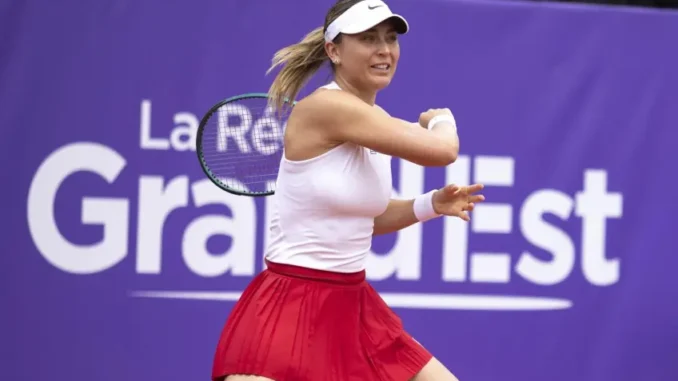
The 2025 Internationaux de Strasbourg, a WTA 500 tournament serving as a critical tune-up for the French Open, delivered a day of dramatic twists and commanding performances on May 20. Paula Badosa, the No. 3 seed and former World No. 2, advanced to the quarterfinals in an unexpected manner when her opponent, Marie Bouzkova, retired due to injury. Meanwhile, Elena Rybakina, the No. 4 seed and 2022 Wimbledon champion, showcased her dominance with a swift 6-1, 6-3 victory over Wang Xinyu, reinforcing her status as a formidable contender. As the clay courts of Strasbourg set the stage for intense battles, these contrasting outcomes highlighted the resilience and challenges faced by two of tennis’s brightest stars.
Paula Badosa’s return to competitive tennis after a two-month hiatus was a focal point of the day. The Spaniard, who had been sidelined since March due to a recurring back injury, stepped onto the Patrice Dominguez Court for her first match since withdrawing from the Miami Open. Facing Bouzkova, a player she had defeated in all three of their previous encounters, Badosa was locked in a gritty battle. The first set was tied at 3-3 after 40 minutes of intense rallies, with Bouzkova breaking Badosa’s serve twice. However, Bouzkova’s left thigh injury forced her to take a medical timeout at 3-2, and she retired shortly after, unable to continue. “It was 3-3 but it was a very long match, as you can see, 40 minutes,” Badosa said, reflecting on the match’s intensity. “It’s always a battle with Marie and I feel very sorry for her with what happened because it was in the middle of the match, so it wasn’t expected from her side.” She expressed relief at being back on court, adding, “I’m happy to be back after two months. It was a tough journey, so finally, being back and getting minutes on court, I really appreciate it. I’m still very far from my level but hopefully I can be there soon.” Badosa’s emotional return, marred by her opponent’s misfortune, sets her up for a quarterfinal clash against either French wildcard Diane Parry or No. 8 seed Liudmila Samsonova.
Elena Rybakina, in contrast, delivered a masterclass in efficiency. The 25-year-old Kazakh, who accepted a wildcard to bolster her clay-court form, needed just 64 minutes to dispatch Wang Xinyu. Rybakina’s celebrated serve was on full display, firing six aces and never facing a break point. “I’m just trying to find my rhythm,” she said post-match, acknowledging her limited clay-court outings this season. With only two wins from Madrid and Rome, where she fell to Bianca Andreescu in the latter, Rybakina’s 2-0 head-to-head record against Wang gave her confidence. Her 6-1, 6-3 rout marked her first Strasbourg appearance since reaching the 2020 final, where she lost to Elina Svitolina. Now ranked No. 12 after dropping out of the top 10, Rybakina is focused on building momentum for Roland Garros. “This is the perfect place to get matches in,” she noted, praising Strasbourg’s competitive field, which includes top-10 players like Jessica Pegula and Emma Navarro. Her next challenge is a quarterfinal against Magda Linette, whom she has defeated in their two prior meetings.
Both players’ journeys in Strasbourg reflect their broader narratives. Badosa, who soared to the Australian Open semifinals earlier this year, has battled a career-threatening back injury that forced her out of much of the 2023 season. “This time, mentally it hurt, because I think I was playing the best tennis of my life,” she said of her latest setback, underscoring the emotional toll of her absence. Her return to the top 10, currently at No. 10, is a testament to her resilience, but she remains cautious, prioritizing pain-free play as she eyes a deep run in Paris. Rybakina, meanwhile, has faced her own challenges, including a coaching controversy involving her former mentor Stefano Vukov and a knee injury from last year’s French Open. Her decision to play Strasbourg, a tournament she last contested five years ago, signals her determination to reclaim her form on clay, where she reached the quarterfinals in 2021.
The Strasbourg draw, featuring seven top-20 players like Barbora Krejcikova and Daria Kasatkina, is a proving ground for Roland Garros hopefuls. Badosa and Rybakina’s performances, though achieved through different paths, highlight their hunger to succeed. As Badosa navigates her recovery and Rybakina hones her game, the tennis world watches eagerly, anticipating how these stars will fare on the grand stage of Paris, where every match could redefine their seasons.
Leave a Reply